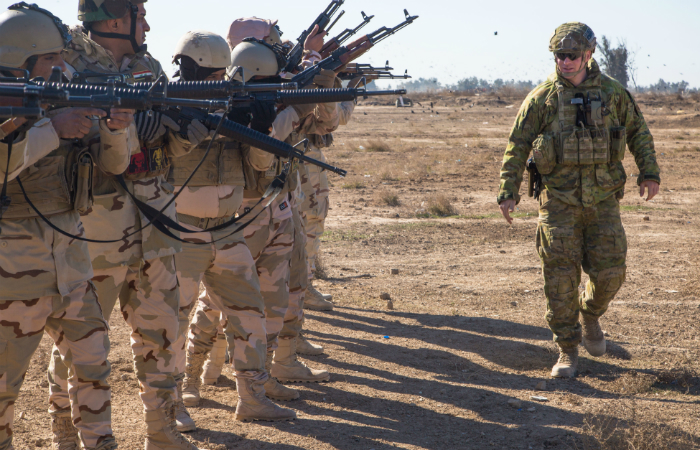Two Cheers for Baghdad
Editor’s Note: The Islamic State is based in Syria and Iraq, and the struggle to fight it crosses borders. However, the two governments of these countries, both rightly maligned and often lumped together, differ tremendously. Douglas Ollivant of New America contrasts the two, pointing out that Iraq remains a functioning partner while the challenges in Syria are far graver.
***

Editor’s Note: The Islamic State is based in Syria and Iraq, and the struggle to fight it crosses borders. However, the two governments of these countries, both rightly maligned and often lumped together, differ tremendously. Douglas Ollivant of New America contrasts the two, pointing out that Iraq remains a functioning partner while the challenges in Syria are far graver.
***
When thinking about the fight against the Islamic State in Iraq and Syria, it is important to remember a key difference in conditions on each side of the international border. While the Islamic State may believe (or at least proclaim) that this border is of no importance, that is simply untrue. On one side of the border, in Iraq, there is a functioning regime with democratic and representative governance that is able to provide a broad range of services—security, health, education—through its institutions. Iraqi democracy and government services are deeply flawed, but they are still quite real. As the Islamic State is pushed out of more and more territory, this government is ready—at least provisionally—to fill the vacuum left behind. On the other side of the border, in Syria, the central government is virtually non-existent outside of the capital, its institutions decidedly weakened, its legitimacy in tatters. The Syrian regime—dependent on Russian and Iranian support, and utilizing militia forces from Lebanon and Iraq—lacks the capacity to extend security and services into territory reclaimed from the Islamic State.
Obviously, the Assad regime retains some control in Damascus and the west and has made impressive military advances, most notably retaking Aleppo, but it is hard to envision it re-establishing control of much of eastern Syria. The level of brutality used by the regime has cost virtually all its legitimacy, at least with the majority Sunni Arab population. Absent that legitimacy, the regime lacks the overwhelming force to project power into the east; its forces will be stretched just trying to hold their existing gains. But on the other side of the border, Iraqi forces have liberated eastern Mosul and coalition-trained paramilitary forces and police are preparing to consolidate control in the area. Additionally, the relatively positive behavior of the Iraqi Popular Mobilization Units and absence of (the often-predicted) mass sectarian slaughter in any of the liberated cities stands in stark contrast to the behavior of the Islamic State, making the return of state control far easier.
The absence of legitimate institutions in Syria has forced the United States to work without a partner on the ground. This causes problems on a multitude of fronts. The first and most obvious is a regime of international law within which to work. In Iraq, U.S. advisors conduct their advisory mission at the express invitation of the sovereign, elected government and airstrikes are delivered under similar invitation. However, it is unclear what legal framework permits U.S. advisors to operate or airpower to strike targets in Syria.
There is a related problem with political control of trained forces. The United States is, essentially, running (at least) three separate “train and equip” programs to counter the Islamic State. One is run out of Baghdad. These forces—the Iraqi Army and Iraqi police—report to Prime Minister Haider al-Abadi. If we have issues with the conduct of these forces, we know who to go see. A second program is run out of Irbil, in Iraqi Kurdistan. These forces—mostly Peshmerga—report to President Masoud Barzani. If we have issues with these forces, we know who to go see. Then there is a third operation being run in Syria to train the Free Syrian Army. It is remarkably unclear who these forces report to, nor is there any political figure who can readily be held accountable. It should go without saying that there are significant risks in training paramilitary forces who report to no responsible political authority, not to mention that the relative successes of the coalition-trained Iraqi and Kurdish forces stand in stark contrast to the failures in Syria.
[There] are significant risks in training paramilitary forces who report to no responsible political authority...
We may come to appreciate the Baghdad government in Iraq even more as we deepen out involvement in Syria. Iraq is not Sweden and dealing with its institutions can be frustrating, but at least there are institutions that are generally seen as legitimate by a significant part of the population. If and when Syria gets to a point where the international community can attempt to provide assistance, I suspect the Syrian government and the nations and NGOs trying to rebuild the state will long, in vain, for institutions that function as do Baghdad’s. For all Baghdad’s faults (and they are myriad), it remains a partner that—for example—clearly desires and aspires to immediately return functioning educational institutions to areas liberated from the Islamic State. It may need help in the form of resources or even capacity from the international community, but the institutions—in this case, Ministries of both Education and Higher Education—are extant, functioning bodies with real capability. Rather than having to “reconstruct” from whole cloth, these ministries can be empowered and reinforced in order to deliver service to liberated areas. Operations on the ground are much simpler with a functioning, legitimate, institutionalized local partner.
By contrast, think of what will have to be done to restore education in—for example—Raqqa. Do we really think the Assad government will have either the desire or the capacity to create schools in Raqqa? Will there be any semblance of policy to direct outside efforts, assuming that they materialize? The degree of difficulty involved will be staggering.
In short, the tendency to conflate Iraq and Syria when discussing the war against the Islamic State does injustice to the partner we have on the Iraqi side of the border. Iraq continues to be a real ally, generally aligned with U.S. interests in the region—albeit with its own strains of localist populism. Despite failings that allowed the Islamic State to gain a foothold in the first place, the Iraqi government has shown itself to be capable (with significant support) of liberating its territory at a deliberate pace, and shows every indication of intending to reintegrate these communities back into the Iraqi polity.
If the United States had a similar partner in Syria, defeating the Islamic State would be much simpler.





